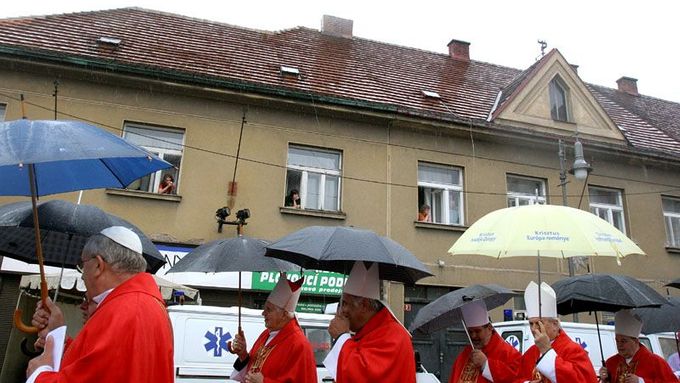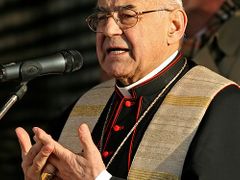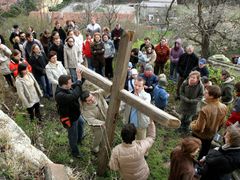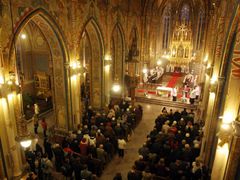Prague - The long-awaited bill to compensate Czech churches for their property confiscated by the state under the communist regime was finally approved today by the Czech government. The bill obliges the government to pay 83 billion CZK to the churches in the course of 60 years.
With 4.85 per cent interest the total amount paid to the churches over the next six decades will go up to 270 billion CZK. Aside from the financial settlement the churches will restitute property of 51 billion CZK.
"It is not going to be an expenditure for the government, but a saving," said the Minister of Culture Václav Jehlička of the Christian Democratic Party when presenting the proposal for state-church property settlement today to his colleagues in the government.
The cabinet members believed him. If the bill is approved by the Parliament and signed by the President, it will come into effect in January 2009. While the law nominally covers all the existing churches, it is mainly Catholic church that will restitute its large historic property.
Not only church to benefit
It is not only the church that will benefit from the approved restitution bill, the cabinet claims.
The state will be allocated property which used to be owned by the churches before 1948 and has value of 83 billion CZK. The use of the property was banned by law and was left idle for many years.
The state will give part of the restituted property to municipalities as well as to the so far uncompensated private persons free of charge. The rest will be sold commercially.
In a public TV debate last Sunday, the senior head of the Czech Catholic Church, Cardinal Miloslav Vlk also pointed out the government has been benefiting from tourists that flock to sightseeing places that used to be owned by the church.
He himself considers the main beneficiary of the bill to be the state.
Weak opponents
Only three influential MPs of the ruling Civic Democratic Party (ODS) object to paying such a high amount to the churches (Miroslava Němcová, Jiří Papež and Vlastimil Tlustý).
The opposition Social Democrats have in principle agreed to compensate the churches but would like to see lower figures paid, too. If at least part of their faction throws their support behind the bill, it is likely to be approved in the Parliament.
Christian Democrats (KDU-ČSL) have steadfastly rejected the ongoing speculation that the church-state settlement, avoided for many years by most of the Czech politicians, was only made possible through a political deal between KDU-ČSL and their senior coalition partner ODS.
In exchange for the bill, the specualtion claims, Christian Democrats pledged to support the incumbent president (and ODS candidate) Václav Klaus in the upcoming February election of the head of state.
Church boom in the atheist country
Under the current legislation, dating back to 1949, the state is obliged to contribute to the operating costs of the churches as well as pay salaries to the clergy.
The state's obligation to pay part of the churches' operating costs will be extended by twenty years, as stated in the draft bill. The amount contributed by the state has so far reached 1.3 billion CZK.
The number of the priests has skyrocketed since the fall of the communist regime in 1989 and the Catholic Church currently has 2,830 clergymen, while in 1991 it only had 1,719. The churches' operating costs are two times higher than eight years ago.
Should the restitution not take place, the state would have to pay a much higher sum than the final 300 billion CZK, Minister Jehlička argued today.
The growth of the number of clergymen is somewhat surprising, given that polls have consistently showed the Czech Republic to be one of the most agnostic countries in the world.
Law Faculty: Church has no property to claim
Interestingly, the Law Faculty of Charles University in Prague claims the church is not entitled to any compensation at all.
The Faculty prepared a study in which it transpires the churches had actually owned no property since 1781 when the Austrian Emperor implemented far-reaching reforms, stripping the Catholic church of many of its privileges. Ever since the property was allegedly only rented to the churches to carry out social activities beneficial to the public.
These laws have not changed until 1990 when the churches have transformed into private entities, law experts say. It makes no sense to return any property to them now, as the churches will not be assigned the original task to do good for the people.
Minister Jehlička and the Social Democrats reject this argument.
"The churches and religious associations have had the right to use their own property as any other private property owner in line with the first Civil Code of 1811," says Kateřina Kalistová from Church Committee of Social Democrats.
Denying churches their property rights could result in a lawsuit against the Czech Republic being filed by the churches with the European Court of Human Rights in Strasbourg, she believes.








